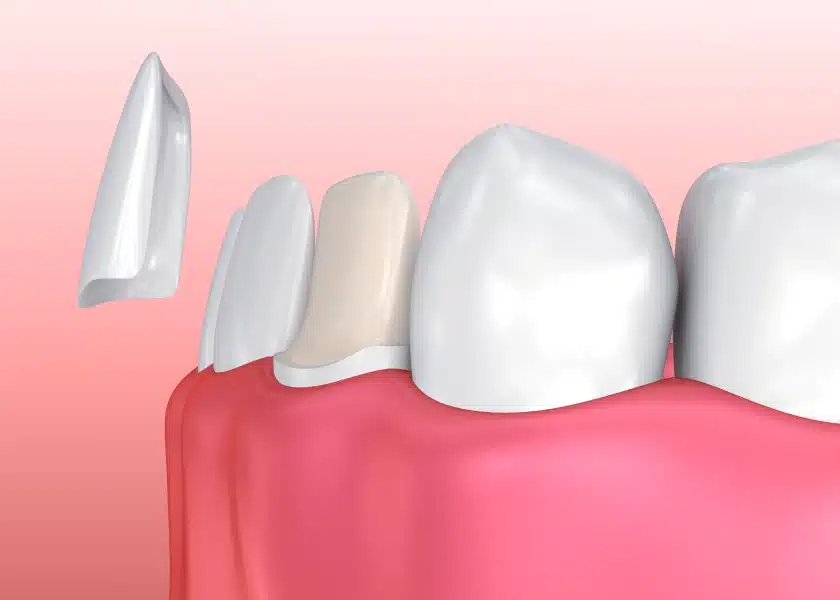Are you curious about the cost of achieving that stunning smile with perfectly shaped, pearly-white teeth? Dental veneers present an attractive solution to common dental imperfections like misshapen teeth, irregular spacing, discoloration, and aging effects. By applying these thin coverings to the front surface of your teeth, veneers can effectively conceal flaws and enhance your smile’s appearance. But how much do veneers cost, and what factors influence their pricing?
Let’s delve into these questions and explore the world of veneers to help you make informed decisions about your smile makeover journey.
How Much Do Various Types of Veneers Cost?
The cost of veneers depends on various factors, including the material used and your location. Here’s a breakdown of the different types of veneers and their average costs:
Composite Resin:
These veneers are the most budget-friendly option. Chairside composite veneers, crafted in the dentist’s office, typically range from $800 to $1,100 per tooth. If made in a laboratory, the cost may be slightly higher.
Porcelain:
Porcelain veneers are well known for their durability and natural appearance. They range in price from $900 to $2,500 per tooth, with an average cost of around $1,500. Remember that porcelain veneers require the removal of a thin layer of enamel, which is irreversible.

Porcelain Laminate:
These ultra-thin veneers are priced between $800 and $2,000 each, with an average cost of $1,800. Unlike traditional porcelain veneers, porcelain laminates offer the advantage of reversible placement without the need for enamel removal.
It’s important to note that the prices mentioned above are typically for a single tooth. The total cost can add up significantly if you’re considering veneers for multiple teeth, such as covering eight front teeth. While most dentists or prosthodontists may not offer discounts for multiple teeth, it’s worth discussing your options with them.
What are the Factors that Affect the Cost of Veneers?
Several factors influence the cost of veneers:
Type of Material:
The material used for the veneers greatly impacts the cost. Porcelain veneers are more costly than composite resin veneers because of their durability and lifelike appearance.

Number of Veneers:
The number of veneers you require directly affects the total cost. Covering more teeth will naturally increase the overall expense.
Location:
The cost of living and dental care varies from one location to another. Veneer prices may be higher in areas with a higher cost of living or greater demand for cosmetic dentistry services.
Dentist's Expertise:
The skill and experience of the dentist who performs the procedure influence the cost. Thus, a highly experienced dentist may charge higher fees for their services.
Additional Procedures:
Additional procedures like teeth whitening or gum contouring are required before veneer placement; they can add to the total cost.
Customization:
Custom-made veneers designed to match your teeth’ natural color, shape, and size may cost more than standard, off-the-shelf veneers.
Insurance Coverage:
Dental insurance does not cover the cost of cosmetic procedures like veneers. However, some may provide partial coverage if the veneers are deemed medically necessary for restoring tooth function or structure.
These factors can help you have a rough estimate of the cost of dental veneers and make informed decisions about your treatment options. It’s essential to consult with your dentist to discuss your needs and receive a personalized cost estimate.
What to Expect While Getting Veneers?
Obtaining porcelain or lab-made composite veneers typically involves two dental visits spaced several weeks apart, each lasting several hours.
During the initial visit, you and your dentist will discuss any underlying dental issues and select the material and shade of your veneers. Local anesthesia will be administered before the dentist gently files away a thin layer of enamel from the front of each tooth to make space for the veneer and allow for proper bonding. This step is generally irreversible. Temporary veneers are placed while the permanent ones are being crafted in the lab. Enamel removal may lead to temporary sensitivity to hot and cold sensations.
On the second visit, a special adhesive replaces the temporary veneers with the permanent ones. For ultrathin laminate veneers, known as ‘no-prep’ veneers, enamel removal may not be necessary.
Composite veneers can be made either in a lab or ‘chairside.’ Chairside veneers are created using digital scans and in-office equipment or by directly applying resin to the teeth. The dentist adds composite resin and bonding agent, shapes the resin, cures it with a high-intensity light, and performs a final polish. Chairside methods allow for same-day creation and installation of veneers.
Maintenance and Consultation Expenses
It’s important to account for additional expenses related to consultations and maintenance as part of your overall treatment costs.
While initial dental consultations are often complimentary, some clinics may charge around $500 for this service. It’s advisable to confirm the consultation fee with your dentist before scheduling an appointment.
Additionally, there may be charges for necessary examinations, including x-rays and dental molding, conducted after the initial consultation.
After the veneers are placed, proper maintenance is crucial. This may involve expenses for ongoing treatment and maintenance services such as dental cleanings.
Conclusion
Understanding the cost of veneers is essential for anyone considering cosmetic dental procedures. While prices vary based on material and location, investing in veneers can create a confident and radiant smile. Remember to consult with your dentist to explore all options and make an informed decision about achieving your desired smile transformation.
Are you ready for your ideal smile? Discover exceptional dental care at Diamond Dental, Mt. Vernon, WA. Schedule your consultation today and discover why we’re the premier destination for veneers and other cosmetic dentistry services. For new patients, dial (360) 512-7258; for existing patients, contact us at (360) 848-6777.
FAQs
Generally, insurance plans do not cover veneers as they are considered cosmetic rather than medically necessary. This applies to other cosmetic dental treatments like teeth whitening and dental crowns as well. It’s essential to know your dental insurance policy to understand the coverage terms and conditions thoroughly.
The industry average for a single porcelain veneer ranges from $900 to $2,500 per tooth. Also, a full set of porcelain veneers range from $7,200 to $20,000.
Veneers typically last between 10 to 30 years with proper care. While you can enjoy most foods, taking precautions is important, as veneers are not indestructible. Porcelain, being glass-like, can break under excessive pressure.






